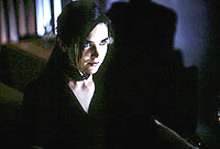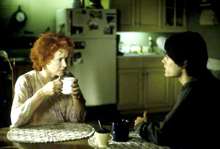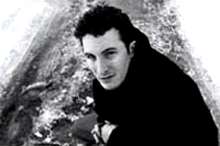
Like Pi, Requiem is concerned with altered states and takes place in its characters’ minds. What attracts you to this kind of filmmaking?
What I’m fascinated in doing on film right now is making a subjective exploration of a person’s reality. The reason we watch movies, I think, is so that we can go on a trip with someone else -- usually, hopefully, someone like Julia Roberts. But if, as a director, you can take that a step further and actually try to have the audience enter the mind of a character on a more visceral level, then, I think, it becomes a more intense experience.
It is the darker aspect of the psyche that you appear to be interested in. Why?
Isn’t that all there is?
I think it’s probably the more interesting aspect, but I don’t think that’s all there is.
I just think there’s more unhappy people on the planet than there is happy people. To feel good about yourself and feel good about your world, you have to go through a lot of darkness. Just look at the planet: it’s a pretty fxxking fxxked-up place.
Does that come more from observation or personal experience?
I definitely felt it. Everyone’s felt it, be it being teased in the school yard or whatever.
Would any of this be connected to your Jewishness?
I’m sure it’s somewhat connected, but I’m sure that everyone on the planet feels that way. There’s an added level of alienation when you’re a Jew just because you never quite belong. Even if you’re assimilated you can never trust because of the history of everything that’s gone down in the last few thousand years. So I think the alienation of that comes through in some of the work. I grew up in New York where there’s a large Jewish population but you feel it anyway somewhat.

The theme of paranoia connects this film to Pi. How do you connect with that theme yourself?
The first initial thought with Pi was always about making a film about a paranoid schizophrenic. I became pretty much a student of it so I probably brought a lot of that to the material.
The theme of obsession is obviously central to Requiem. Do you see yourself as an obsessive?
Yes, I’m very obsessive.
If you weren’t making films, where would another outlet for your obsession be?
I don’t know, I never was obsessive about anything until filmmaking came along. It was the first thing that kept me awake at night. So I don’t know where it would have ended up. Probably on my kids, if I had kids. Raising kids I probably would have been like Sara Goldfarb (the character played by Ellen Burstyn), just totally giving too much love.
How exacting are you on set in terms of what you want?
I’m pretty relaxed these days. I used to be like Woody Woodpecker: I used to run around like that redheaded woodpecker trying to do everything. Now I try to be focused but also to have a good time.
You use a lot quick-fire editing in this film, particularly in the drug-taking scenes. Where does that come from and what was the intent?
We call it the ‘hip hop montages’, and I think it comes from growing up in Brooklyn in the 80s listening to hip hop music. There’s been hip hop art, graffiti, hip hop music, rap, and hip hop dance, but there hasn’t been any films that used hip hop techniques to help tell story. We use quick images and sounds to help push the narrative forward.
You use also employ split screen to show that even in the most intimate of moments, your characters are separate existentially. That’s quite a negative view of relationships.
Well that’s the exact point of it. If they were to deal with their presence and really be present, as opposed to being addicted to each other, then maybe they could change their lives. The fact they’re separated is what keeps them apart.
Do you see this around you as well? It always strikes me that no matter how close you get to someone, we are all still trapped within our own consciousness and therefore separate.
I’m not sure yet. I’m still thinking about that question. It’s one of the big ones. God, I hope not. I’m a romantic and I hope what it’s about is those times when you do connect – when sex is right, when you make children, when you’re in love. That’s sort of what it’s about. I mean love is about surrendering your own ego and your own self to someone else. Sure you can die being out of love, you can be born out of love, but I think the reason people relate to Romeo and Juliet so deeply is because those people die in love. So did they really die for themselves or for each other? The fact that intellectually and emotionally we get that so deeply, means there’s some truth to it.
The theme of addition in the film appears to be part of a critique of consumerist culture.
Well I think when Selby says Requiem for a Dream, he’s talking about the American Dream, which he calls the great opiate of the masses. He’s basically talking about how so many people chase that as a pipe dream and that’s what ends up destroying them.
Turning to your cast, they really give their all in this film. How did you go about gaining their trust?
Trust is just time and communication. Letting them know you, explaining to them what you’re doing, no surprises, except where they help the performances, especially not with emotionally revealing stuff. We spent about a month rehearsing the actors and that helped a lot.

What kind of surprises did you spring to help the performances? Surely nothing could surprise Ellen Burstyn after working with William Friedkin on The Exorcist.
You know, with Ellen she wanted me to scare her. When the fridge jumps she wanted us to scream. So I started screaming, then I got the DP to scream with me, then I got the whole crew to scream. Then I got a megaphone and I screamed. I wasn’t really scaring her -- a loud noise would just make the twitch a little bit more real, and I came up with different ways to do that.”
It’s great to see her in the film because I don’t think we see enough of her these days. What made you hit upon her for the role?
To tell you the truth it was a little bit luck. I always knew she was a great, great actor, but because of all the ageism and sexism out there I hadn’t seen her since the late Seventies in a major role. I didn’t realise what I was getting.
Why was it so important for you to keep the final sex scene in as is? You got the NC-17 rating but you weren’t going to compromise at all.
It wasn’t so much the sexuality that was the problem but more the psychological intensity of the three-minute climax of the film. Personally, I like the controversy because I think it attracts the right audience to the movie. This isn’t your normal film, and I don’t want normal audiences to come. I want people that have a hunger for something different.
Finally, what’s happening with Batman 5?
I have been hired to write it, and potentially direct it. I also have another film set up at Warner Bros, an untitled film that I have been pitching as a post-Matrix metaphysical science-fiction movie.
What do you want to bring to the franchise most?
Everything you’ve seen up this point, throw it out. We’ll be completely different.
Do you have any anxieties about working in the mainstream?
I have a lot of caution, but I’m excited too. It will be fun to work on that level.
Pi and Requiem for a Dream are so much your vision, how do you think that’s going to work in the mainstream?
We’ll see. I’m just concerned about getting the right movie made.